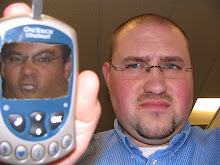Hypoglycemia Unawareness
- Bolusing by grams of carbs vs. straight units of insulin. I used to do the calculation in my head and just enter the amount of insulin in units. I would total up all the grams of carbs, then divide by 8 (1:8 ratio) which would give me the amount of insulin needed. Now I just enter in the carbs (the Cozmo has this great "Meal Maker" feature which allows me to enter each item individually and it totals it all up - a fancy calculator) and IT does the necessary calculation for me. I think this also helps keep me honest. I figure there were many scenarios where I didn't want to own up to how many carbs I was eating for a snack or something, and would just "punch in" a handful of units. This would start the rollercoaster effect and I'd be riding it until I was motivated enough to stop it.
- Trusting the pump. The pump has an adjustable "duration of insulin" figure and keeps track of the amount of insulin "on board". If you tell it to, it will factor this amount into any boluses entered while there is insulin "on board". I trust whatever the pump suggests for the most part (unless it is totally ridiculous, which has never happened yet).
- Using the "Correction Bolus" more. Pretty much anytime I test my blood sugar I will enter it into the pump (or use the CoZmonitor which attaches onto the back of my pump) and ask for a correction bolus. If the pump calculates that I don't actually need any insulin it will "suggest" a bolus of 0.00 units. This really helps keep me closer to my target (100). Another way I use this is to avoid lows. If I do a test and come in at say 119, but I still have some insulin on board, I know I need to have a little snack to avoid a reaction in the near future.
- Using the "Combination Bolus" more for my fatty meals. This option splits my meal bolus into a portion that delivers some right away and some over a period of time. Even splitting a high fat or protein meal into a 70%/30% split seems to make a big difference. I certainly don't have it down to a science, but even just experimenting with it more is making a big difference.
Where I'm going with all this is as I spend more time with a BG closer to my target, I've noticed that I'm not feeling my moderate lows as much as I used to. I used to feel symptoms at very close to 70, sometimes even 80'ish. Now I am surprised when I do a test to find myself mid to low 60's or even 50's and not feeling any noticeable symptoms.
As I thought about posting on this topic I wanted to check into some details about it. I have a copy of "Pumping Insulin" by John Walsh and Ruth Roberts at work here, and there is a small chapter dedicated to hypoglycemia unawareness. There is a whole list of situations that can trigger this, and they say the major culprit is frequent low blood sugars. With that in mind, I'm quite sure that I've had more lows lately - which happens as you tighten your control.
Have any of you had problems with this? What have your experiences been? Anyone able to deal with it in a positive way?
On a somewhat related note, I attend a monthly pump group in the area. It's a nice social atmosphere and I've gained a lot from the group. On occasion we have a guest, and last year we were visited by a woman who had severe problems with hypoglycemia unawareness. She has enlisted the help of a service dog! It was the most incredible meeting I've been to! Her service dog was still in training (the tests & training are incredibly thorough) but he had successfully caught a handful of lows that she was not aware of. It was really something special. I do think we'll see more of that type of thing as more people become aware of other services these special dogs can provide. There are also many people that have stories about their cats and dogs helping them wake up at night during a reaction, etc. I think it's pretty neat!


